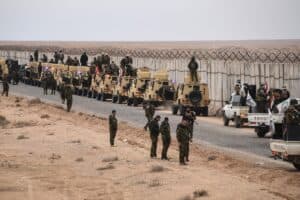In terms of what a post-civil war Syria will look like, the great unanswered question is: what happens to the Syrian Kurds?

So far, the end-game in Syria has played out in an entirely predictable way.
All of Aleppo is back in the Syrian government’s hands, that decisive victory for President Bashar al-Assad and his Russian backers has been followed by a ceasefire and the Russians are organising a peace conference in Astana, Kazakhstan, later this month.
The one surprise is that Turkey, long the rebels’ most important supporter, will be co-chairing the conference.
This means that Turkey’s President Recep Tayyip Erdogan has made a deal of some sort with Russia’s President Vladimir Putin, for Astana is clearly going to be a Russian show. (The United States has not been invited and Saudi Arabia probably won’t be asked to attend, either.)
So what kind of deal has Erdogan made with Putin? The details may well have been fudged, for Turkey has not yet renounced its long-standing insistence that Assad must step down as the Syrian leader.
Assad has won the war, thanks largely to Russian and Iranian intervention, and the Syrian rebels are doomed.
Turkey is now cooperating with Russia; in three weeks Donald Trump will be US president and also cooperating with Moscow; and Saudi Arabia is hopelessly overcommitted to its futile war in Yemen. Even little Qatar has now lost interest.
ALSO READ: Other side of the matric coin
The rebels are completely on their own and their only options are surrender or dying in the last ditch. Syria’s rebels are almost all Islamists of one sort or another by now, but the less extreme ones will probably be offered an amnesty at Astana in return for signing a peace deal.
The extreme Islamists – Islamic State, which controls much of eastern Syria and western Iraq, and the former Nusra Front, which controls much of northwestern Syria – have not been invited to Astana. But a military victory over Assad is no longer possible, so these groups are destined to lose on the battlefield and revert to mere terrorism. In terms of what a post-civil war Syria will look like, the great unanswered question is: what happens to the Syrian Kurds?
They are only one-tenth of the Syrian population, but they control almost all the Kurdish-majority areas across northern Syria. As America’s only ally on the ground in Syria, they have played a major role in driving back Islamic State.
They are not Islamists, they are not terrorists and they have avoided military confrontation with Turkey despite President Erdogan’s war on his country’s own Kurdish minority.
Yet Erdogan publicly identifies the Syrian Kurds as Turkey’s enemy and they have not – or at least not yet– been invited to the Astana peace conference. Was Erdogan’s price for switching sides a free hand in destroying Rojava, the proto-state created by the Syrian Kurds?
Very probably, yes. So, even if the current ceasefire holds and even if the peace conference at Astana goes exactly according to Moscow’s plan, there is still some fighting to be done in Syria.
Assad’s army, with Russian and Iranian support, will have to suppress both Islamic State and the former Nusra Front and the Turks will have to subjugate the Syrian Kurds.
This will take time, but with no more weapons and money flowing in from outside – since Turkey has turned off the taps – it will probably happen in the end. Which means that Assad will probably one day rule again over a united Syria.
For more news your way, follow The Citizen on Facebook and Twitter.
Support Local Journalism
Add The Citizen as a Preferred Source on Google and follow us on Google News to see more of our trusted reporting in Google News and Top Stories.






